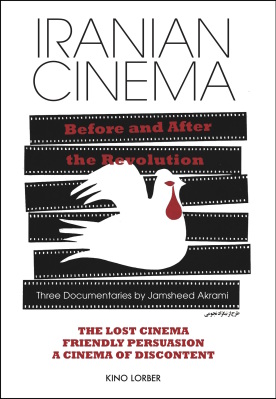Iranian Cinema Before and After the Revolution: Three Documentaries by Jamsheed Akrami (DVD)
Iranian Cinema Before and After the Revolution is an illuminating two-disc set that includes a trilogy of documentaries by film scholar Jamsheed Akrami, Friendly Persuasion (2000) gives an overarching portrait of Iranian cinema through interviews with three generations of Iranian directors - from New Wave visionaries (Abbas Kiarostami) to post-revolutionaries (Mohsen Makhmalbaf) and the third generation (Jafar Panahi). The Lost Cinema (2007) digs deeper into the Iranian New Wave, which blossomed as a counter-cinema in the 1970s and ended up banned due to the severely restrictive censorship codes imposed by the Islamic government after the 1979 Revolution. A Cinema of Discontent (2013) focuses on contemporary censorship codes by interviewing twelve filmmakers (from Asghar Farhadi to Dariush Mehrjui) about how they cope with or circumvent these restrictions. Taken together, along with the bonus short film A Walk with Kiarostami (2003), these films provide a deep and wide-ranging exploration of a courageous and fiercly creative national cinema.
- Jamsheed Akrami - Director
- Jafar Panahi - Himself
- Abbas Kiarostami - Himself
- Bahman Ghobadi - Himself
- Asghar Farhadi - Himself
- Dariush Mehrjui - Himself
- Rakhshan Bani Etemad - Himself
- Bahman Farmanara - Himself
- Fatemeh Motamed Aria - Herself
- Babak Payami - Himself
- Noureddin Zarin Kelk - Himself
- Reza Mirkarimi - Herself
- Mojtaba Raee - Herself
- Kamal Tabrizi - Himself
Reviews
“Entertaining and informative doc … enriching for those who follow Iranian cinema closely and an eye-opener for less worldly film buffs.”
“A Comprehensive portrait of a national art form…. A must-see for any serious fan of Iranian film…. “Friendly Persuasion” is more inspiring than depressing. For its message is an encouraging one: somehow art will find a way.”
“…. Two meticulous and insightful film essays that unpack some of the major issues of Iranian cinema- particularly the repressive censorship- through interviews with auteur filmmakers and choice extracts from their movies. (Akrami’s) The Lost Cinema: Iranian Political Films in the Seventies (2006), focuses on the Pahlavi period’s new-wave political cinema, while his Friendly Persuasion: Iranian Cinema after the 1979 Revolution (2000) centers on the emergence of art-house films in the Islamic Republic. These film essays are essential companions to any course on Iranian cinema.”
“A splendid introduction to films from a country that has established one of the world’s finest national cinemas.”
For press and publicity inquiries, please email press@kinolorber.com. A selection of press materials for this title may be available for download here.

